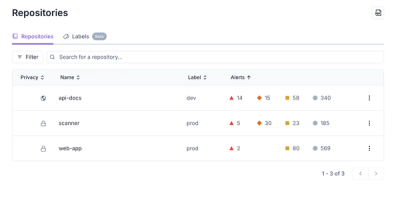
Product
Redesigned Repositories Page: A Faster Way to Prioritize Security Risk
Our redesigned Repositories page adds alert severity, filtering, and tabs for faster triage and clearer insights across all your projects.
This library implements expect tests (also known as "golden" tests). Expect
tests are a method of writing tests where instead of hard-coding the expected
output of a test, you run the test to get the output, and the test framework
automatically populates the expected output. If the output of the test changes,
you can rerun the test with the environment variable EXPECTTEST_ACCEPT=1 to
automatically update the expected output.
Somewhat unusually, this library implements inline expect tests: that is to say, the expected output isn't saved to an external file, it is saved directly in the Python file (and we modify your Python file when updating the expect test.)
The general recipe for how to use this is as follows:
Write your test and use assertExpectedInline() instead of a normal
assertEqual. Leave the expected argument blank with an empty string:
self.assertExpectedInline(some_func(), """""")
Run your test. It should fail, and you get an error message about
accepting the output with EXPECTTEST_ACCEPT=1
Rerun the test with EXPECTTEST_ACCEPT=1. Now the previously blank string
literal will contain the expected value of the test.
self.assertExpectedInline(some_func(), """my_value""")
# test.py
import unittest
from expecttest import TestCase
class TestStringMethods(TestCase):
def test_split(self):
s = 'hello world'
self.assertExpectedInline(str(s.split()), """""")
if __name__ == '__main__':
unittest.main()
Run EXPECTTEST_ACCEPT=1 python test.py , and the content in triple-quoted string
will be automatically updated.
For people who use pytest:
from expecttest import assert_expected_inline
def test_split():
s = 'hello world'
assert_expected_inline(str(s.split()), """""")
Run EXPECTTEST_ACCEPT=1 pytest test.py , and the content in triple-quoted string
will be automatically updated.
For parameterized tests, advanced fixturing and other cases where the
expectation is in a different place than the assertion, use Expect:
from expecttest import Expect
def test_removing_spaces(s: str, expected: Expect) -> None:
expected.assert_expected(s.replace(" ", ""))
test_removing_spaces("foo bar", Expect("""foobar"""))
test_removing_spaces("foo bar !!", Expect(""""""))
Run EXPECTTEST_ACCEPT=1 pytest test.py , and the content in triple-quoted string
will be automatically updated.
Often, you will want to expect test on a multiline string. This framework
understands triple-quoted strings, so you can just write """my_value"""
and it will turn into triple-quoted strings.
Take some time thinking about how exactly you want to design the output format of the expect test. It is often profitable to design an output representation specifically for expect tests.
FAQs
Unknown package
We found that expecttest demonstrated a healthy version release cadence and project activity because the last version was released less than a year ago. It has 2 open source maintainers collaborating on the project.
Did you know?

Socket for GitHub automatically highlights issues in each pull request and monitors the health of all your open source dependencies. Discover the contents of your packages and block harmful activity before you install or update your dependencies.

Product
Our redesigned Repositories page adds alert severity, filtering, and tabs for faster triage and clearer insights across all your projects.

Security News
Multiple deserialization flaws in PyTorch Lightning could allow remote code execution when loading untrusted model files, affecting versions up to 2.4.0.

Security News
NVD now marks all pre-2018 CVEs as "Deferred," signaling it will no longer enrich older vulnerabilities, further eroding trust in its data.